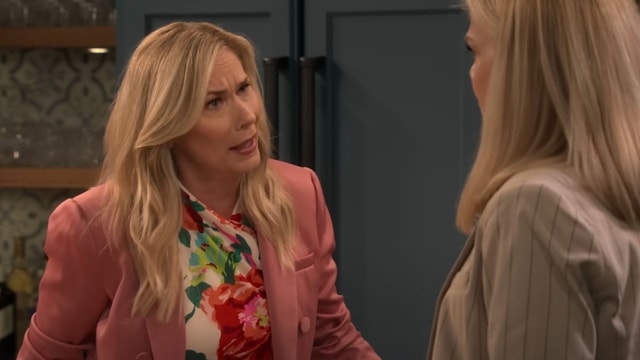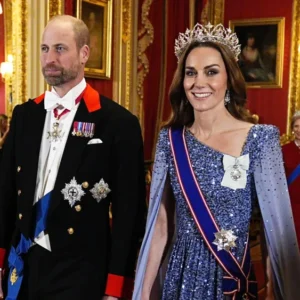As of August 25, 2025, Netflix’s heartfelt comedy “Leanne” has solidified its spot as a streaming sensation, amassing over 60 million viewing hours since its July 31 premiere and sparking endless debates on family ties in the wake of betrayal. Co-created by sitcom maestro Chuck Lorre and Susan McMartin, the 16-episode series stars comedian Leanne Morgan as Leanne Murphy, a Southern grandmother thrust into singlehood after her husband’s shocking affair. But amid the laughs and life lessons, it’s the raw sibling rift between Leanne and her firecracker sister Carol (Kristen Johnston) that steals the show—culminating in a gut-wrenching feud over a family heirloom that tests their unbreakable bond. This isn’t just sibling squabbling; it’s a profound exploration of favoritism, validation, and the messy path to reconciliation, making “Leanne” a mirror for anyone who’s felt like the family outsider.

At the heart of this conflict is Carol, Leanne’s twice-divorced, child-free sister who’s the polar opposite of her traditional sibling. While Leanne built a life around marriage, kids, and church, Carol’s world revolves around bars, bad boyfriends, and blunt truths. From the series opener, Carol swoops in as Leanne’s “ride or die,” moving into her sister’s home to provide comic relief and tough love after Bill’s (Ryan Stiles) betrayal. They share a bed—Leanne can’t sleep alone after 33 years—leading to hilarious late-night chats about hot flashes and heartbreak. Johnston’s portrayal shines with snarky wisdom, coaching Leanne through dating disasters, like a cringe-worthy night out where Leanne accidentally flashes her date while hiding a sweat stain. “Honey, life’s too short for bad sex and boring men,” Carol quips, embodying the show’s blend of humor and heart. But beneath the banter lies deeper tension: Carol’s lifelong feeling of being the “black sheep,” overshadowed by Leanne’s picture-perfect life.
The feud erupts in Episode 9, “Chipmunk in the Drywall,” a pivotal midpoint that digs into generational wounds. During a family gathering at their parents’ home—Mama Margaret (Celia Weston) and Daddy John (Blake Clark)—the sisters help sort through belongings amid Margaret’s health scares. The flashpoint? Their late grandmother’s cherished china set, a symbol of family legacy and affection. Leanne receives the elegant fine rabbit china, while Carol gets a humiliating bag of 3,000 pennies—literal pocket change. This disparity isn’t just material; it unearths Carol’s buried resentment. “Why does she always get the good stuff? The husband, the kids, the damn dishes?” Carol explodes, accusing Leanne of staying silent during the distribution, enabling their parents’ favoritism. Johnston delivers a powerhouse performance here, her voice cracking with vulnerability as Carol storms out, declaring she’s done playing second fiddle. The argument escalates into a full-blown exit: Carol packs up and returns to her lonely apartment, leaving Leanne reeling from yet another loss. This departure amplifies Leanne’s isolation, forcing her to confront how much she’s relied on Carol’s chaos to distract from her own pain.
Digging deeper, this conflict masterfully unpacks themes of sibling rivalry in midlife. Carol’s arc reveals the emotional toll of feeling undervalued—her divorces, lack of kids, and “non-traditional” choices have left her questioning her worth. In flashbacks sprinkled throughout the season, we see young Carol as the rebellious one, always compared to “perfect” Leanne. The china becomes a metaphor for inherited inequalities: Leanne’s set represents stability she no longer has, while Carol’s pennies mock her perceived failures. Lorre’s writing elevates this beyond comedy, drawing parallels to real-life “gray area” family dynamics where adult siblings grapple with parental biases. As Leanne reflects in therapy sessions, “Family’s supposed to be your safety net, but what if it’s full of holes?” This rift pushes both women to grow: Leanne experiments with independence, joining a book club that turns into a support group, while Carol, alone in her apartment, tries “being nicer” to strangers, hilariously failing at small talk in a coffee shop scene that had viewers in stitches.
The reconciliation unfolds in the Season 1 finale, “New Beginnings,” delivering a twist that’s equal parts tearful and triumphant. Amid the chaos of Bill’s panic attack (mistaken for a heart attack) and Leanne’s son Tyler’s wife going into labor, Carol shows up at the hospital but hovers on the edge, ready to bolt again. In a raw hallway confrontation, Leanne apologizes profusely: “I should’ve spoken up. You’re not second best—you’re my everything.” Carol, holding back tears, admits her jealousy stemmed from fear of being alone forever. The turning point? Carol cradles the newborn granddaughter, a symbol of fresh starts. “Turns out, family’s not about what you get—it’s about who sticks around,” she says, her tough exterior cracking. This moment seals their bond, with Carol deciding to stay, not just for the baby but for herself. It’s a subtle twist—no grand gestures, just authentic forgiveness—that opens doors for future arcs, like Carol exploring new relationships or the sisters teaming up against family secrets.

What makes this storyline so engaging is its relatability in a world of fractured families. “Leanne” doesn’t sugarcoat reconciliation; it’s earned through vulnerability, much like Leanne’s budding romance with FBI agent Andrew (Tim Daly). By series end, the sisters emerge stronger, with Carol’s return reinforcing Leanne’s support network. As Morgan noted in interviews, “Sisters fight like cats, but they love like lions.” With Season 2 rumors swirling—perhaps delving into Carol’s past—this feud-turned-friendship reminds us that family heirlooms aren’t porcelain; they’re the people who mend the breaks. Stream “Leanne” now—it’s a hilarious, heartfelt reminder that sometimes, the biggest twists come from those closest to home.





